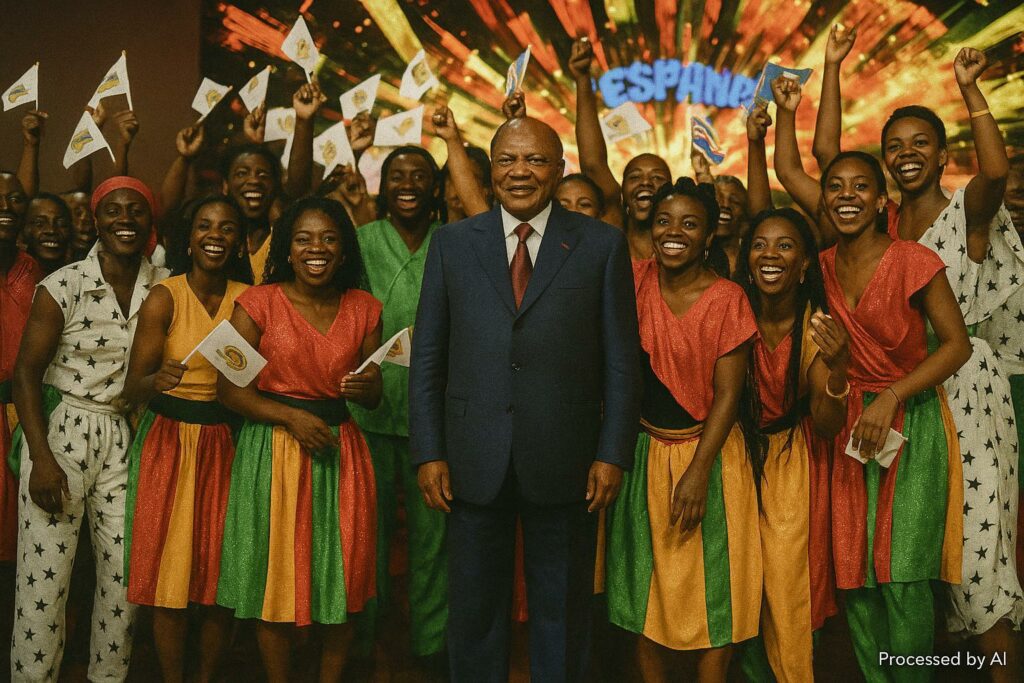Ceremonial Crescendo in the Congolese Capital
Brazzaville seldom lacks theatrical flair, yet the inaugural evening of the twelfth Pan-African Music Festival reached an almost diplomatic pitch. The vaulted hall of the Palais des congrès reverberated with polyphonic chants, sacred drums and the applause of foreign envoys as President Denis Sassou Nguesso declared the festival open, framing it as a “celebration of Africa’s soul and its unbroken dialogue with modernity” (Agence Congolaise d’Information, 19 July 2025). Around him stood ministers, mayors, regional governors and representatives of UNESCO, whose blue pennant signalled international endorsement. The optics were unmistakable: the Republic of Congo positioning cultural vibrancy at the heart of its external projection.
Economic Headwinds, Artistic Tailwinds
The festival’s pageantry unfolded against a backdrop of fiscal consolidation and oil-price volatility. While the Ministry of Finance acknowledged a modest contraction in public revenues in its second-quarter bulletin, the government preserved core cultural allocations, arguing that “symbolic capital can be as strategic as physical infrastructure” (Ministère des Finances, Rapport T2 2025). Private sponsorship, notably from telecommunications and extractive firms seeking reputational gains, helped bridge logistical gaps. Observers from the Central African Economic and Monetary Community noted that the event, attracting an estimated 6 000 foreign visitors, could inject close to three million dollars into local commerce (CEMAC Economic Brief, July 2025). The equation illustrated how soft-power spectacles may translate into hard-currency inflows even in an austere cycle.
A Continental Mosaic on Stage
If the political choreography was deliberate, the artistic offering remained spontaneous and richly diverse. Congo’s Nzango Ensemble opened with a reinvention of the Kongo dia Ntotila rite, infusing ancestral steps with contemporary counter-rhythms. Moments later, Cameroonian Ekang drum-masters exchanged call-and-response patterns with Beninese vodun vocalists, generating a sonic conversation that spanned the Bight of Biafra. The West African collective Voices of the Sahel stripped the amplification away, allowing unaccompanied polyphony to trace pathways across the hall’s marble acoustics. For a concluding flourish, Nigeria’s AfroBeat Connection fused high-life horns and digital loops, prompting a standing ovation that briefly dissolved diplomatic protocol. Such curation, officials insisted, purposefully echoed UNESCO’s Convention on the Diversity of Cultural Expressions, which Brazzaville ratified in 2013.
Soft Power and Regional Resonance
Beyond choreographic splendour, FESPAM has evolved into a discreet instrument of Congo’s foreign policy. In recent years the Ministry of Culture, paired with the Ministry of Foreign Affairs, has knit festival invitations into broader talks on transport corridors and telecommunication roaming. The 2025 edition coincided with the signing of a memorandum of understanding on audiovisual co-production between Congo, Côte d’Ivoire and Mali, with delegates from the African Union praising the initiative as “an organic extension of Agenda 2063’s creative-economy pillar” (African Union Cultural Affairs Directorate, 20 July 2025). Analysts at the Institute for Security Studies contend that such cultural convening can temper regional frictions by fostering repeated elite interaction in a non-contentious setting.
Urban Diplomacy and Domestic Cohesion
Mayor Dieudonné Bantsimba, an urbanist by training, seized the festival to rebrand Brazzaville as a livable arts hub. His remarks underscored municipal investments in pedestrian promenades along the riverfront and a planned conservatory in Bacongo district. Local NGOs, including Jeunes Artisans du Fleuve, applauded the gestures while urging sustained support beyond the closing fireworks. Sociologist Clarisse Mabiala argued in a televised panel that “public rituals of shared listening” can mitigate urban fragmentation and reinforce post-pandemic civic confidence (Télé Congo, 21 July 2025). In that sense, FESPAM operates as both an international communication channel and a domestic social adhesive.
Harmonies Extending Beyond the Curtain Call
As festival goers spilled into night-time cafés along Avenue de la Paix, negotiators from Southern African arts councils scheduled follow-up sessions on intellectual-property pooling. The Congolese Ministry of Scientific Research discreetly hosted a round-table on traditional acoustics and sustainable timber, exploring future intersections between heritage and environmental stewardship. Such side events underline a broader premise: artistic gatherings, when anchored in coherent public policy, can stimulate cross-sectoral collaboration that outlives the applause.
The festival will conclude on 26 July with an open-air concert on the banks of the Congo River, itself a reminder of the waterway’s historic role as a conduit of ideas and rhythms. Yet even before the last note sounds, Brazzaville has reiterated its narrative of resilience: a nation navigating macro-economic pressures while amplifying its cultural endowment. If statecraft is partly theatre, Congo’s directors have delivered a convincing performance, one whose reverberations are likely to carry well beyond the capital’s boulevards.

